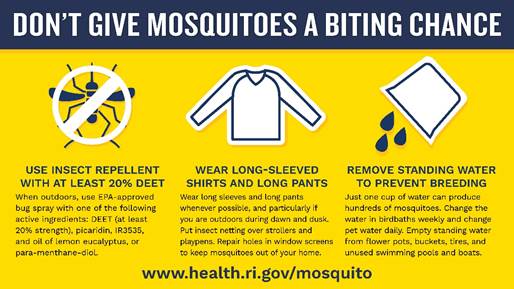Weekly Mosquito Advisory
PROVIDENCE – The Rhode Island Department of Environmental Management (DEM) today announced that 133 mosquito samples from 43 traps set on Monday, August 24 and August 26, and 76 pools collected from 30 traps set on August 31 have tested negative for both West Nile Virus (WNV) and Eastern Equine Encephalitis (EEE).
To date, in Rhode Island, there has been one finding of EEE in a mosquito sample from Chapman Swamp in Westerly, and no findings of WNV in mosquito samples. A white-tailed deer in North Kingstown was confirmed positive for EEE on August 21. In Massachusetts, there have been four human cases of EEE, 65 findings of EEE, and 87 findings of WNV in mosquito samples this year. In Connecticut, there have been two positive findings of EEE in Eastern Connecticut and 123 findings of WNV in statewide mosquito samples. There have been no human cases of EEE or WNV in Connecticut this year.
Personal protection is the first line of defense against mosquitoes that may carry WNV, EEE, or other diseases – and the most effective way to avoid infection. With WNV and EEE established throughout the state, DEM and RIDOH remind the public to eliminate mosquito breeding grounds and prevent being bitten, whenever possible. While outdoor spaces reduce the likelihood of exposure to COVID-19, they pose a greater risk of exposure to mosquito-borne diseases. For this reason, DEM and RIDOH emphasize that if Rhode Islanders are going to be outside during the peak “biting hours” – at dawn and dusk – to wear your face masks, long sleeves and pants, and use insect repellent. The following precautions are advised.
Protect yourself
- Put screens on windows and doors. Fix screens that are loose or have holes.
- At sunrise and sundown (when mosquitoes that carry EEE are most active), consider rescheduling outdoor activities that occur during evening or early morning. If you must be outside, wear long-sleeved shirts and long pants and use bug spray.
- Use EPA-approved bug spray with one of the following active ingredients: DEET(20-30% strength); picaridin, IR3535; and oil of lemon eucalyptus or paramenthane. Always read the label and follow all directions and precautions.
- Do not use bug spray with DEET on infants under two months of age. Children should be careful not to rub their eyes after bug spray has been applied on their skin. Wash children’s hands with soap and water to remove any bug spray when they return indoors.
- Put mosquito netting over playpens and baby carriages.
Get rid of mosquito breeding grounds
- Get rid of anything around your house and yard that collects water. Just one cup of water can produce hundreds of mosquitoes; an unused tire containing water can produce thousands of mosquitoes.
- Clean your gutters and downspouts so that they can drain properly.
- Remove any water from unused swimming pools, wading pools, boats, planters, trash and recycling bins, tires, and anything else that collects water, and cover them.
- Remove or treat any shallow water that can accumulate on top of a pool cover. Larvicide treatments, such as Mosquito Dunks can be applied to kill immature mosquitoes. This environmentally-friendly product is available at many hardware and garden stores and on-line.
- Change the water in birdbaths at least two times a week and rinse out birdbaths once a week.
Best practices for horse owners
Horses are particularly susceptible to WNV and EEE. Horse owners are advised to vaccinate their animals early in the season and practice the following:
- Remove or cover areas where standing water can collect.
- Avoid putting animals outside at dawn, dusk, or during the night when mosquitoes are most active.
- Insect-proof facilities where possible and use approved repellents frequently.
- Monitor animals for symptoms of fever and/or neurological signs (such as stumbling, moodiness, loss of appetite) and report all suspicious cases to a veterinarian immediately. If you are unsure if your horse is properly vaccinated, you should consult with your veterinarian.
Visit http://www.health.ri.gov/mosquito for additional mosquito prevention tips, videos, and local data.
Mosquitoes are trapped weekly by DEM and tested at the RIDOH State Health Laboratories. DEM issues advisories on test results from July through September, with additional reports as necessary. Test results are pending for traps set on September 8 and will be included in future announcements. Typically, positive test results trigger additional trapping to assess risk.
For more information about DEM divisions and programs, visit www.dem.ri.gov. Follow us on Facebook at www.facebook.com/RhodeIslandDEM or on Twitter (@RhodeIslandDEM) for timely updates.
